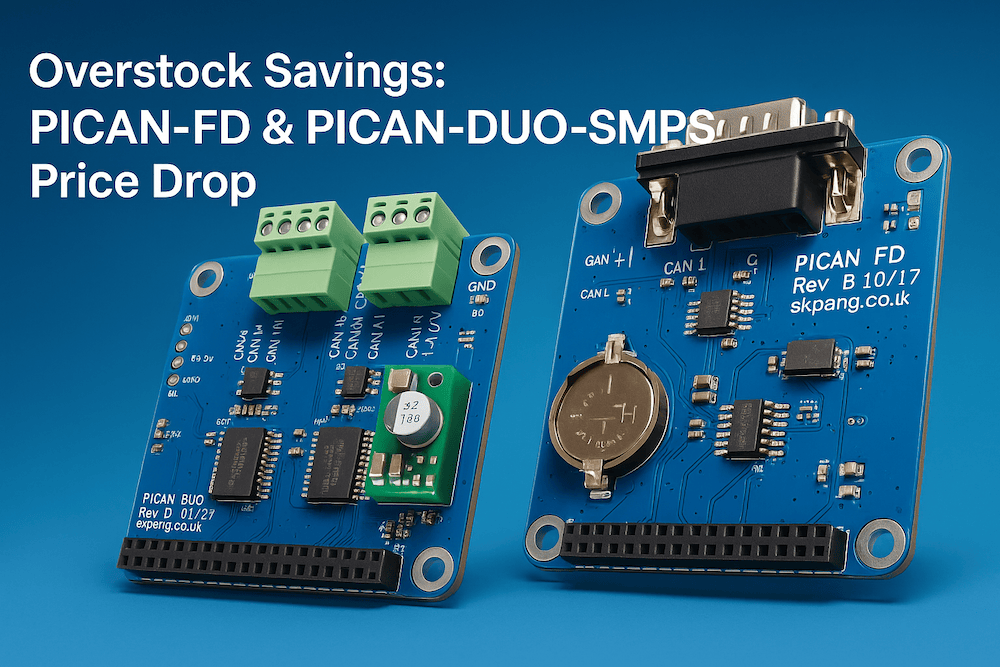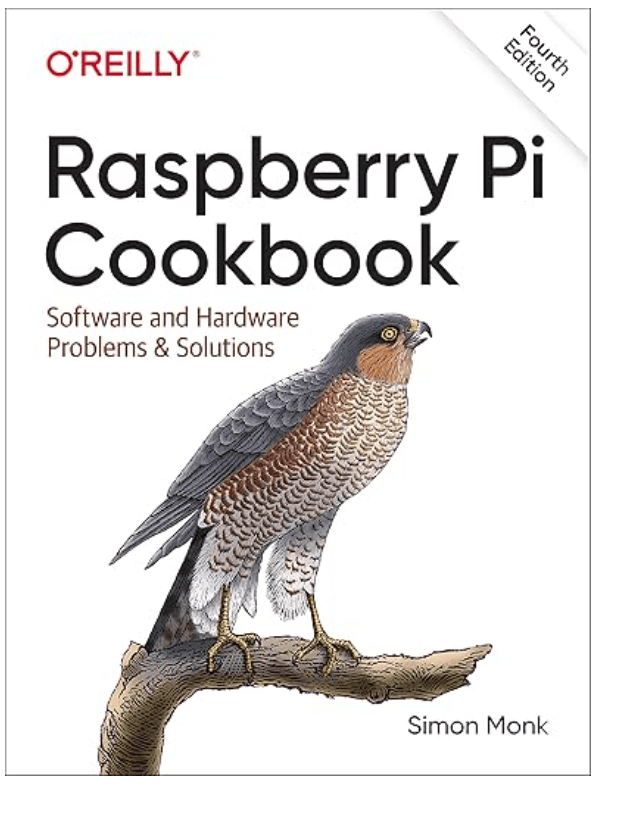Blog
Recent Posts
Overstock Savings: PICAN-FD & PICAN-DUO-SMPS Price Drop
Posted by on
 As of today's date, we’ve temporarily reduced pricing on our PICAN-FD and PICAN-DUO-SMPS boards to help balance inventory. This is a great opportunity to get professional-grade Raspberry Pi CAN-Bus solutions at a lower cost—while supplies last.
As of today's date, we’ve temporarily reduced pricing on our PICAN-FD and PICAN-DUO-SMPS boards to help balance inventory. This is a great opportunity to get professional-grade Raspberry Pi CAN-Bus solutions at a lower cost—while supplies last.
Unlock powerful CAN‑Bus functionality for your Raspberry Pi projects with Copperhill’s PICAN‑FD and PICAN‑DUO‑SMPS boards!
 The PICAN‑FD (US$49.95 - was US$69.95) brings next‑generation CAN FD support—leveraging the Microchip MCP2517FD controller and MCP2562FD transceiver for up to 8 Mbps data throughput—plus a battery‑backed real‑time clock (RTC) for reliable time‑stamping, all delivered via a swift SPI interface and backed by SocketCAN compatibility.
The PICAN‑FD (US$49.95 - was US$69.95) brings next‑generation CAN FD support—leveraging the Microchip MCP2517FD controller and MCP2562FD transceiver for up to 8 Mbps data throughput—plus a battery‑backed real‑time clock (RTC) for reliable time‑stamping, all delivered via a swift SPI interface and backed by SocketCAN compatibility.
 Meanwhile, the PICAN‑DUO‑SMPS (US$69.95 - was US$99.95) adds dual independent CAN 2.0B channels to your Raspberry Pi 4 using robust MCP2515 controllers, with each channel accessible via screw‑terminal, and an integrated 5 V/3 A switch‑mode power supply that efficiently powers both the board and your Pi from 7–24 V sources—ideal for rugged, streamlined installations.
Meanwhile, the PICAN‑DUO‑SMPS (US$69.95 - was US$99.95) adds dual independent CAN 2.0B channels to your Raspberry Pi 4 using robust MCP2515 controllers, with each channel accessible via screw‑terminal, and an integrated 5 V/3 A switch‑mode power supply that efficiently powers both the board and your Pi from 7–24 V sources—ideal for rugged, streamlined installations.
Perfect for automotive diagnostics, industrial automation, data logging, or robotics, these boards give you high-speed CAN connectivity, system reliability, and clean integration—all in one smart package.
Don’t miss this chance to enhance your Raspberry Pi with professional-grade CAN-Bus capability—order your PICAN-FD or PICAN-DUO-SMPS today and take advantage of reduced pricing while inventory lasts. Whether you’re building automotive, industrial, or robotics applications, these boards deliver the speed, reliability, and power you need. Act now and secure yours before they’re gone!
If you’ve explored the world of Raspberry Pi, you already know its capabilities keep expanding. The fourth edition of this bestselling cookbook delivers over 200 practical, hands-on recipes—with full code examples—that show you how to get the most out of this tiny, low-cost computer. From running Linux and programming with Python to connecting sensors, motors, and IoT devices, you’ll find step-by-step solutions to power your projects. This edition also introduces new chapters on the Raspberry Pi Pico and using machine learning for vision and sound recognition.
Inside, you’ll learn how to:
-
Set up your Raspberry Pi and connect it to a network
-
Work with its Linux-based operating system
-
Program with Python for rapid development
-
Add computer vision and machine learning to recognize objects, video, and sounds
-
Control hardware via the GPIO connector and drive different types of motors
-
Interface with switches, keypads, and sensors for measuring temperature, light, and distance
-
Build IoT connections and automate your home
-
Integrate the Raspberry Pi Pico microcontroller with your projects
CAN Bus Development with Raspberry Pi vs Arduino Due Using Copperhill Technologies Hardware
CAN Bus (Controller Area Network) is an essential protocol in automotive, industrial, and embedded systems. Its robustness, real-time capabilities, and multi-master structure make it the go-to solution for everything from vehicle diagnostics to robotic motion control. Two popular platforms for CAN Bus development are the Raspberry Pi and the Arduino Due. Copperhill Technologies supports both platforms [...]
Introducing the ESP32 with Dual Isolated CAN Bus Port
The ESP32 Development Board is renowned for its versatility, boasting features like Wi-Fi, Bluetooth, and ample processing power. When combined with the Dual Isolated CAN Bus HAT, it transforms into a formidable tool for CAN bus communication. Key Features: Dual CAN Channels: Facilitates simultaneous communication over two separate CAN networks. Galvanic Isolation: Each CAN channel is electrically isolated, [...]
The Quest for Programmable Embedded Systems with Multiple CAN/CAN-FD Ports
I regularly receive inquiries about programmable systems that support more than two CAN interfaces—either Classical CAN, CAN FD, or a combination of both. Most requests center around four ports, though some applications require even more. To be transparent from the outset: available solutions in this space are limited. While platforms like Arduino and Raspberry Pi offer [...]
Unlocking Next-Gen IoT and Industrial Automation with the ESP32 Development Board Featuring CAN FD and RTC HAT
In today's fast-paced world of embedded system design, developers face increasing pressure to deliver high-performance, reliable, and future-ready solutions for industrial and automotive applications. Whether you're building smart transportation systems, advanced robotics, or robust automation networks, one of the most important decisions you’ll make is choosing the right development hardware. The ESP32 Development Board with CAN [...]
 Loading... Please wait...
Loading... Please wait...

